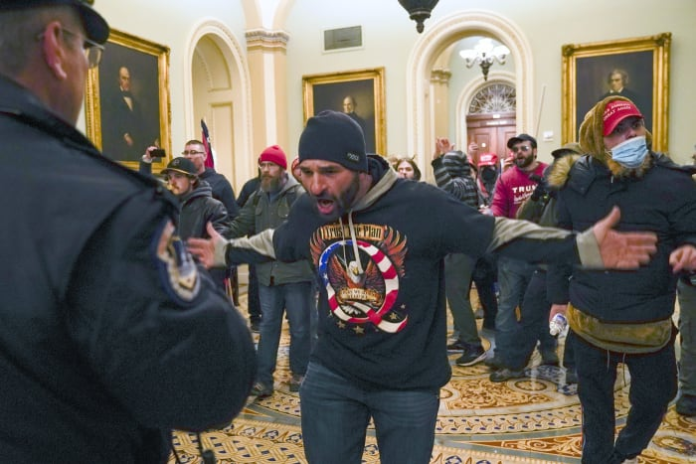FILE – In this Jan. 6, 2021, photo, Trump supporters, including Douglas Jensen, center, confront U.S. Capitol Police in the hallway outside of the Senate chamber at the Capitol in Washington. The Iowa man was “weaponizing” rioters who joined him in chasing a police officer up a staircase during one of the most harrowing scenes from a mob’s attack on the U.S. Capitol, a prosecutor told jurors on Friday, Sept. 23, 2022, at the close of his trial. (AP Photo/Manuel Balce Ceneta, File)
WASHINGTON – An Iowa man was “weaponizing” rioters who joined him in chasing a police officer up a staircase during one of the most harrowing scenes from a mob’s attack on the U.S. Capitol, a prosecutor told jurors on Friday at the close of the man’s trial.
Douglas Jensen had a folding knife in his pocket and was wearing a T-shirt expressing his adherence to the QAnon conspiracy theory when he joined the rioters who stormed the Capitol on Jan. 6, 2021. One of the videos that went viral after the siege captured Jensen at the front of the crowd that followed Capitol Police Officer Eugene Goodman up the stairs.
“The defendant wasn’t just leading the mob. He was weaponizing it,” Assistant U.S. Attorney Hava Mirell said during closing arguments for Jensen’s trial. “He knew he had the numbers, and he was willing to use them.”
Jurors began deliberating in the case against Jensen, a construction worker who is among hundreds of people charged with federal crimes for their conduct at the Capitol on Jan. 6. Jensen’s shirt — which depicted a large “Q” and a bald eagle along with two QAnon slogans — made him stand out from the crowd of rioters.
Defense attorney Christopher Davis said the shirt was a symbol of Jensen’s adherence to QAnon, which centered on the baseless belief that former President Donald Trump was secretly fighting a Satan-worshipping cabal of “deep state” enemies, prominent Democrats and Hollywood elites. During Trump’s time in the White House, QAnon spread beyond the internet’s fringes to influence mainstream Republican circles.
“The (COVID-19) pandemic did weird things to us. It did weird things to everyone,” Davis said. “Apparently, Mr. Jensen was one of them.”
Jensen believed the conspiracy theory’s apocalyptic prophesy that “The Storm” was coming and would usher in mass arrests and executions of Trump’s foes, including Vice President Mike Pence. Before the riot, Trump and his allies spread the false narrative that Pence somehow could have overturned the results of the 2020 election.
After scaling the outer walls of the Capitol, Jensen climbed through a broken window to enter the building. Prosecutors said Jensen learned from a friend’s text message that Pence was about to certify the election results.
“That’s all about to change,” Jensen replied.
Pence was presiding over the Senate on Jan. 6 as a joint session of Congress was convened to certify President Joe Biden’s 2020 electoral victory. Photographs showed Jensen with his arms extended as he confronted a line of police officers near the Senate chambers.
“Go arrest the vice president,” Jensen told one of the officers, according to prosecutors.
“This was a terribly confused man on Jan. 6,” Davis said of his client.
The defense lawyer urged jurors to judge Jensen by his own actions and not by what others did at the Capitol.
“Jan. 6 is not sitting at that table. Douglas Jensen is,” Davis said, pointing to his client.
Jensen didn’t testify at his trial, which started Tuesday. Goodman was a key witness for prosecutors.
Before running upstairs, Goodman approached Jensen and other rioters with his hand on his gun. Fearing for his life, Goodman retreated upstairs and found backup from other officers guarding an entrance to the Senate, where senators were being evacuated, according to prosecutors.
“That was not a game of follow the leader. That was Officer Goodman in survival mode,” Mirell said.
Jensen is charged with seven counts, including charges that he obstructed Congress from certifying the Electoral College vote, that he assaulted or interfered with police officers and that he engaged in disorderly conduct inside the Capitol while carrying his knife. He isn’t accused of brandishing the knife.
“Doug Jensen would not be stopped on Jan. 6 until he got what he came for, and that was to stop the peaceful transfer of power,” Mirell said.
Davis said Jensen didn’t forcibly assault Goodman or anybody else.
“It’s all on video,” he said. “He never did it.”
Mirell argued that Jensen didn’t have to physically touch Goodman to be found guilty of an assault charge.
“Just a threat to use force,” she said.
Jenson drove back home to Des Moines, Iowa, a day after the riot. The following day, he walked six miles to a police station and showed up unannounced, saying he was probably a wanted man. But there weren’t any warrants for his arrest when two FBI agents questioned him at the station.
Jensen told the agents he considered himself a “digital soldier” who was “religiously” following QAnon. He said he worked his way to the front of the crowd because he “wanted Q to get the attention.”
“I basically intended on being the poster boy, and it really worked out,” he said, according to a transcript of the interview on Jan. 8, 2021.
At least 880 people have been charged with Capitol riot-related federal crimes. Approximately 400 of them have pleaded guilty. Juries have convicted eight Capitol riot defendants after trials. None of the defendants who had jury trials was acquitted of any charges.


